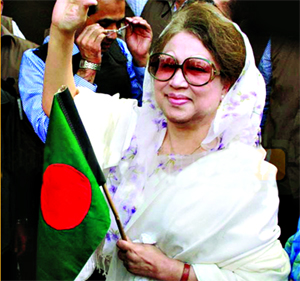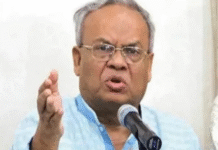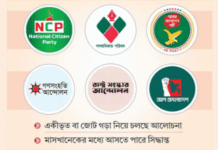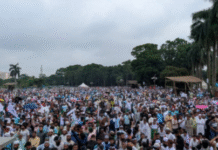Sadeq Khan
After nearly a month-long programme of siege of Dhaka (with short intermissions) left the national capital virtually cut off from the rest of the country blocking railway, waterway and road communications, and the commercial capital of the country rendered immobile for weeks at a stretch, the Leader of the Opposition Begum Khaleda Zia gave a call on Christmas eve for a Democracy March to Dhaka from all over the country to converge in a grand rally on the streets, which she would address from in front of her party office in Naya Paltan on December 29.
As her 18-party alliance prepared for the Democracy March by holding rallies, processions and agitational programmes to mobilise caravans towards the capital city, the government clamped down a total grip of its own siege of Dhaka by blocking all inter-district traffic enroute to Dhaka on highways, railways and waterways. Even flights by air were also restricted, and countrywide hunts were carried out by a fiercely aggressive joint forces’ control room to comb out and lock in leaders and leading activists of the 18-party opposition alliance under preventive detention, implicating them in gang cases at will.
Begum Zia was herself put under virtual house arrest, and movement in front of her house was blocked by police, keeping truckloads of sand to set up physical barriers if her followers approach in big numbers. No mediamen were allowed near her house, but TV cameraman and newsmen managed to evade police surveillance to go over the boundary wall of her house by a ladder from the grounds of an adjacent building, and interview her at the gate of her residence. A furious leader of the Opposition, after being prevented by misbehaving policemen from getting into her security vehicle to proceed to her party office in Naya Paltan, told newsmen and TV cameras present that the democracy march programme will continue next day or the day after until fruition. Indeed the apprehension of marchers from mofussil towns and villages descending on the capital city forced the ruling party to keep all entries to the city shut under government-imposed siege for full three days from December 27 evening to January 30 evening; while organised gangs of ruling party mastans were allowed by the police to romp the streets of the metropolis with sticks in their hands and small arms in belts visible with some of them, and to viciously attack opposition-minded pressmen and lawyers across the gates of the Press Club and the Supreme Court respectively.
Purpose served
Khaleda Zia’s speech, under police restriction at the gate of her house was broadcast verbatim on most of the channels as an address to the nation. As such, it served the purpose of her scheduled address before the rally planned to have been held in front of BNP central office in Naya Paltan on December 29. On December 30, Adviser to Begum Khaleda Zia Advocate Khondaker Mahbub Hossain announced a new programme of protest demonstrations through the last day of the year (giving respite to reveler of the 31st night partying elite in the metropolis) and continuous siege of the roads, railways and waterways to condemn Dhaka to isolation to force the abandonment of the charade of January 5 elections.
Thus the New Year has begun with life in the country disrupted by the agitational measures of the opposition and with an overwhelming public anguish over the state of the besieged economy both at micro and macro levels. A ray of hope comes from a renewed initiative from geopolitically active foreign powers to find a negotiated settlement over the mode of transition of power in Bangladesh, and associated socio-political unrest. The cue seems to have come from the Indian External Affairs Minister Salman Khurshid who in a press interview acknowledged the need for a common approach between India and the United States on Bangladesh. He said as published on December 30, “We don’t discuss democracy in third countries but we do hope the U.S. …. there were obviously some deterrence’s or perception [with respect to Bangladesh] that I noticed last time I was there [Washington], particularly in the dealing of the present government with some of their own internal institutions.
“While the U.S. is at some distance from Bangladesh, we are right next to it. So our understanding of the region and understanding of sentiments of the people in the region should be helpful in the positions they want to take.
Bangladesh situation is obviously very uncertain and delicate because the Opposition and the government have not been able to come to an agreement on how to proceed. We don’t take sides on what happens in elections in a friendly country. For democracy to prosper there should at least be a commitment that violence will not be allowed to distort the democratic process.”
SH/Variation of approach
Later on the same day, at a regular press briefing in Washington, US State Department Deputy Spokesperson Marie Harf said: “We are prepared to reengage our efforts and in particular our observation efforts at a later time if there is a more conducive environment, but we are disappointed that so far they haven’t done so.” There was commonality of approach with that of the Indian External Affairs Minister in so far as she said: “As we’ve said repeatedly, violence is not acceptable for a number of reasons, but in part because it subverts the democratic process. And we have called on it to stop immediately.”
But otherwise, the approach of the United States and the United Nations remain very much at variance with that of India, as they reportedly want postponement of the January 5 election schedule (India does not want any foreign pressure to interfere with “what happens in elections in a friendly country”) and as leaked Taranco report to the UN Secretary General suggests, Sheikh Hasina’s withdrawal from state power by “going on leave” in the least for the election period to obtain a level playing field for the contenders of power.
In her press briefing, Marie Harf expressed her disappointment that the major political parties have not yet reached a consensus on holding free, fair, and credible elections. She said, US Ambassador Dan W Mozena had met leaders of the political parties on many occasions and discussed the volatile situation in the country. State Department Assistant Secretary Nisha Desai Biswal also visited Bangladesh before her official swearing-in, as she thought the trip was crucial. Referring to US Secretary of State John Kerry’s phone call to Sheikh Hasina over the election stalemate and Jamat leader Abdul Quader Mollah’s execution provoking violence in Bangladesh, Marie Harf also said: “I am sure some phone calls have been made from this building,” to leaders in Bangladesh. Dan Mozena, US Ambassador to Bangladesh visited Begum Khaleda Zia under conferment in her residence, and told reporters: “BNP Chairperson Khaleda Zia and I [Mozena] discussed the democratic process, the responsibility that the government has to provide political space to the opposition so that it can freely express its political views, and the responsibility that the opposition has to use the space peacefully.
“I noted that the incidents on Sunday at the Supreme Court, press club and Dhaka University were most disturbing as they were contrary to the democratic process and must not be allowed to recur.”
Clearly, this express US thinking on Bangladesh is very much at odds with the thinking expressed by the Indian External Affairs Minister to the Indian press.
Source: Weekly Holiday










